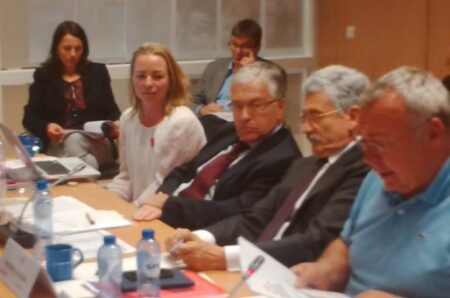The conference “Turning Point of May 2014 – reflections session on the European elections 2014” was followed by a public debate, attended by over 100 participants. Chaired by FEPS Secretary General Ernst Stetter, FEPS President FEPS President Massimo D’Alema opened the debate by pointing out the rise of populists and euro-sceptics movements in these elections, but above all he hailed the successful result of the Italian Democratic Party. D’Alema ‘This Italian victory for PD, receiving more than 40% of the votes, could be analysed as a clear signal of a political change in delivering promises and replying to social demands, which voters have awarded.’
Former Austrian Prime-Minister and chair of FEPS Next Left Alfred Gusenbauer praised the outstanding achievement of the Italian PD. Stating that the gap between policy makers and voters is very wide. ‘The complicated language policy makers and politicians use with all their abbreviations make people think they are elitist and that they use such language deliberately. The quality of Matteo Renzi, in addition to may other qualities, is that he is able to talk about difficult policies in an appropriate way taking all complexities in consideration in circles like parliament and government rooms, but is able to transmit his messages in understandable language to the outside world’.
Marije Laffeber said that this election campaign was more European than any of the previous 4 European election campaigns. ‘The PES and our member parties created a truly Europe wide campaign. With a short and to the point common manifesto, a common candidate: Martin Schulz visiting almost every single member state, participating in over 200 events in more than 60 cities. And with parties helping to each other on the ground, in the press and on social media. In addition of all European election campaigns, the PES campaign was the most visible one. A unique element of the PES campaign was the “Knock the digital vote#knocktheVote” grassroots mobilisation campaign with activists from all member parties taking part. Reaching 12 million extra voters through knocking on doors and one to one conversations with individual voters. Last but not least the impressive use of social networks with 240 million voters reached from 1st March to 25th May’, Laffeber said.
Labour UK MEP Richard Corbett added that in the UK Labour achieved the impressive number of 7 million voter contacts in the last elections. These numbers are not calculated in the knockthevote numbers. Corbett said that the most important challenge ahead of the new European commission is not the names of the new commissioners, but the content of the programme the Commission is going to propose.
Of course we had all hoped for an even better result, but in contrast with the other large political parties the PES is the only party that stabilised compared with the 2009 elections. So there is a fair chance of becoming the biggest party in 2019!



